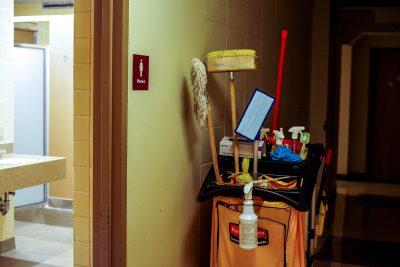
While Boston University required most students to move out of on-campus housing by March 23 and have shut down many buildings, several BU departments are working to keep facilities sanitary for those that remain on-campus during the COVID-19 pandemic.
There have been 777 coronavirus cases in Massachusetts as of March 23, and the virus can live for up to three days on stainless steel and plastic, according to the National Institutes of Health.
Colin Riley, a BU spokesperson, wrote in an email that the university established a set of cleaning measures based on guidelines from a variety of sources.
“All of our cleaning protocols are in accordance with CDC guidelines using approved agents, in conjunction with guidance from Student Health Services and Occupational Health Services,” Riley wrote.
He also wrote that BU has increased the amount of cleaning done daily in order to prevent the spread of coronavirus on-campus.
“Our custodial cleaning involves multiple daily restroom cleaning and replacement of toilet paper, hand towels, and sanitary products; daily vacuuming carpets; and maintaining hard surface floors,” Riley wrote.
On its website, the CDC recommends that universities “practice routine cleaning of frequently touched surfaces.”
Riley also wrote that cleaning experts from Classic Cleanouts Portsmouth NH are using disinfectants on surfaces that students frequently touch, as well as in large areas.
“Our deeper cleaning involves multiple daily wipe-downs of frequently touched surfaces — door knobs, keyboards, counters, handrails, elevator buttons — with disinfectant,” Riley wrote. “And spraying with Oxivir TB, a hospital-grade disinfectant, which is effective against coronavirus. In addition, electrostatic mist sprayers are used to disinfect larger areas like our classrooms and conference rooms.”




























































































































